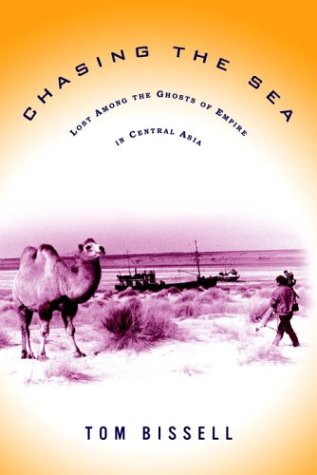
RPCV Tom Bissell points out the contradictions in the legacy that the Soviets left behind in Uzbekistan
Soviet Relict
Tom Bissell points out the contradictions in the legacy that the Soviets left behind in Uzbekistan.
By Michael Bernstein
One of the less noted results of the American Civil War was Russia's decision to switch its primary cotton supply from the U.S. South to Central Asia. Without giving much thought to long-term consequences, the Russians (and then the Soviets) went about irrigating the region's vast deserts by aggressively rerouting the feeder rivers of the Aral Sea.
The repercussions were grave, as Tom Bissell writes in "Chasing the Sea: Lost Among the Ghosts of Empire in Central Asia" -- both environmentally and culturally. What just 40 years ago was the fourth largest lake in the world and one of the world's most ecologically diverse areas was reduced to a puddle of toxic-waste-fueling dust storms, irregular weather patterns and irreversible health problems for those who live nearby. Formerly thriving seaside towns are now hundreds of kilometers from the sea's receding shores. Species of fish have died out and the disappearance of millions of migrating birds has left the region a feeding ground for mosquitoes.
A former Peace Corps volunteer who finished only seven months of a 27-month stint on the outskirts of Tashkent, Bissell returned to Uzbekistan in 2001 to write an article about the Aral Sea's devastation, and gives an account of that trip in "Chasing the Sea." Pairing up with Rustam, a tall, witty Uzbek guide and translator, Bissell zigzags through Tashkent, Samarkand, Bukhara, Ferghana and finally Karakalpakistan, the semi-autonomous zone along the shores of the Aral Sea. In part, the book is a young man's travelogue, following Bissell and Rustam as they play billiards with provincial gangsters, eat a boiled lamb's head, attend a mountaintop funeral-turned-drinking binge and drive cross-country with a convicted murderer.
But through his many conversations with Rustam, Bissell also comes to understand the cultural confusion that many Uzbeks feel today as they confront their violent history and negotiate a tug-of-war between their ethnic unity and increasingly pervasive Western influences. While Rustam claims to support an independent Uzbekistan free of Soviet repression, he is unable to shake a feeling of indebtedness to the very colonizers who put his country on the map. "Everything Uzbekistan has is because of the Soviets, dude," Rustam explains to Bissell. "Uzbeks are simple people. The Soviets made us modern."
Still, modernization comes at a price, and Bissell's book is a plea for human restraint. With the current U.S. administration apparently bent on scrapping years of hard-won environmental legislation, the sight of Moynaq -- a former fishing town now reduced to a scrapyard of stranded boats, starving cattle and tuberculosis -- turns Bissell into a determined environmentalist.
"Chasing the Sea" is an ambitious work, as it attempts not only to relay the narrative of the disappearing sea, but to interweave firsthand findings with a mammoth amount of background information. Bissell is obviously well-read on the subject, but his tendency to weigh down the travelogue with increasingly lengthy history lessons makes for an exhausting read. At the same time, he never quite masks a naivetÎ that marks him an outsider through his incessant expressions of contempt for the Peace Corps and guilt for abandoning it.
But these shortcomings can easily be ascribed to the author's passing acquaintance with Uzbekistan, and, for the most part, "Chasing the Sea" is an informed, subtle and humorous take on a country that for decades has been relegated to the back pages of history.
Michael Bernstein teaches English literature in Moscow.
